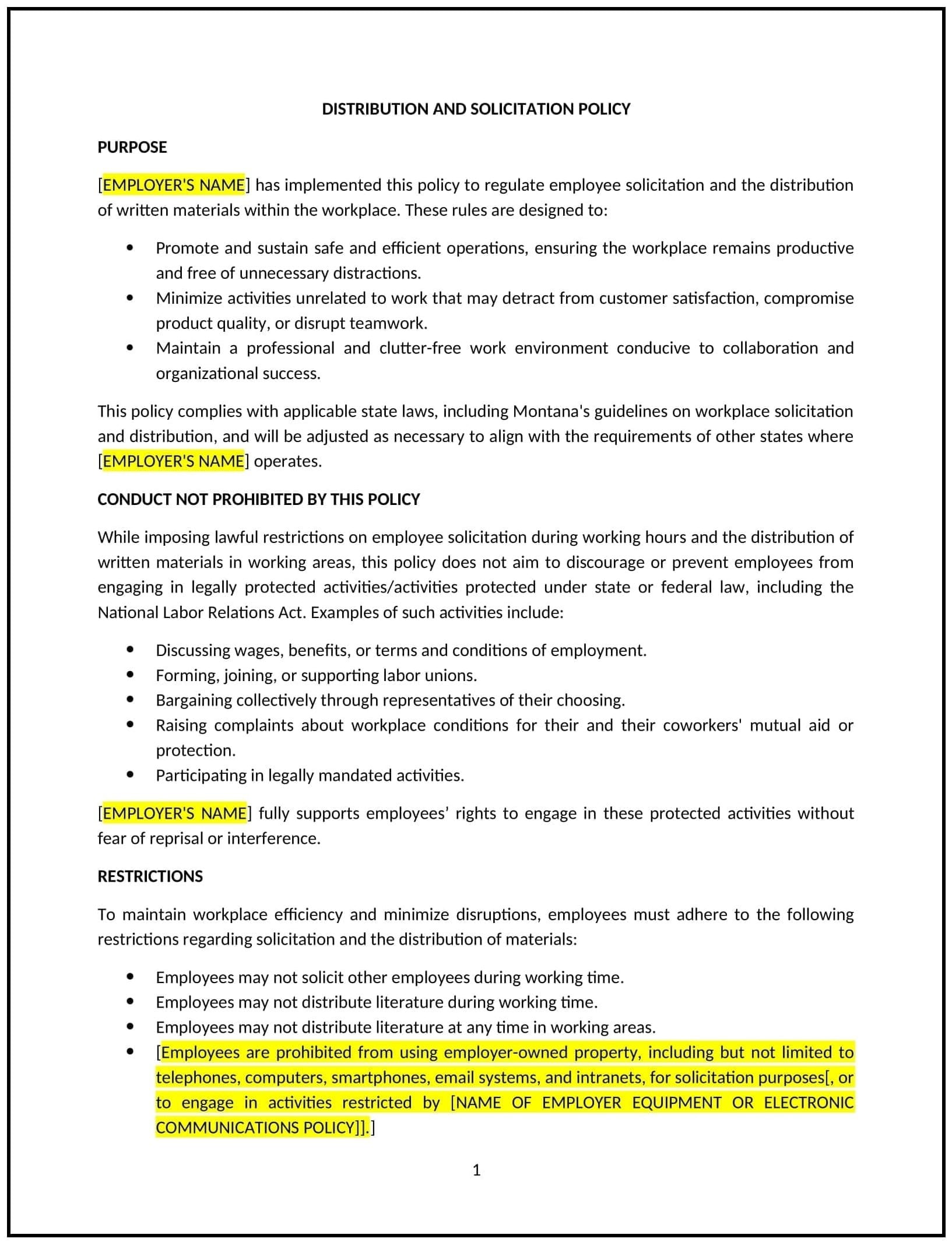Distribution and solicitation policy (Montana): Free template
Got contracts to review? While you're here for policies, let Cobrief make contract review effortless—start your free review now.

Customize this template for free
Distribution and solicitation policy (Montana)
A distribution and solicitation policy helps Montana businesses establish clear guidelines for the distribution of materials, products, and services, as well as the solicitation of business, donations, or other requests within the company. This policy outlines acceptable practices for external communications and marketing, the handling of promotional materials, and interactions with outside vendors, charities, or sales representatives.
By implementing this policy, businesses can control their marketing activities, maintain a professional image, and avoid unwanted solicitations or unauthorized distribution within the workplace.
How to use this distribution and solicitation policy (Montana)
- Define acceptable distribution and solicitation activities: Businesses should specify which activities are allowed, such as the distribution of marketing materials, promotional products, or charity solicitations. The policy should clarify whether these activities are allowed in common areas, via email, or through personal interactions.
- Set guidelines for external vendors and third parties: Businesses should outline the process for external vendors or sales representatives to distribute materials or solicit business. This may include setting up appointments, obtaining approval, or limiting distribution to designated areas within the business.
- Establish rules for employee participation in solicitation: The policy should clarify whether employees can engage in solicitation for causes like charity drives, political campaigns, or other personal ventures while on company time or premises.
- Determine location and timing of solicitations: Businesses should decide where and when solicitations and distributions are allowed, such as in break rooms or outside business hours, to minimize disruptions to daily operations.
- Outline consequences for violations: Businesses should specify the consequences of violating the solicitation policy, including warnings, removal of materials, or restrictions on future solicitation opportunities.
- Promote transparency: The policy should encourage open communication with employees and external parties about the distribution and solicitation rules and procedures.
- Review and update regularly: Businesses should periodically review the policy to ensure it meets legal requirements, addresses new marketing practices, and aligns with business goals.
Benefits of using this distribution and solicitation policy (Montana)
This policy provides several key benefits for Montana businesses:
- Reduces workplace disruptions: Clear guidelines help manage when and where solicitations can occur, preventing unnecessary disruptions to daily business operations.
- Protects the company’s image: By controlling external marketing and solicitation, businesses can maintain a professional image and avoid unwanted or unauthorized promotional activities.
- Improves employee productivity: The policy ensures that employees can focus on their work without distractions from solicitations or unsolicited marketing materials.
- Enhances transparency and fairness: By defining rules for all parties involved, businesses create a level playing field for employees and external vendors, ensuring fairness and consistency.
- Supports compliance with laws and regulations: A structured policy helps businesses comply with state and local regulations concerning solicitation and distribution, reducing the risk of legal issues.
- Promotes charitable giving in an organized way: When charitable solicitations are allowed, businesses can control and manage these efforts, ensuring that they align with company values and objectives.
Tips for using this distribution and solicitation policy (Montana)
- Communicate the policy clearly: Ensure all employees are aware of the distribution and solicitation guidelines and understand where they can request approval for such activities.
- Provide a structured approval process: Set up an easy-to-follow system for employees and external vendors to submit requests for distributing materials or soliciting donations.
- Set boundaries to prevent abuse: Clearly outline the areas and times where solicitation is allowed to avoid overuse or disruption in workspaces.
- Monitor and enforce the policy: Ensure compliance by regularly reviewing and removing unauthorized materials or activities that violate the policy.
- Evaluate the policy’s effectiveness: Periodically assess the policy to ensure it remains effective in balancing marketing efforts with the need to maintain a professional workplace.